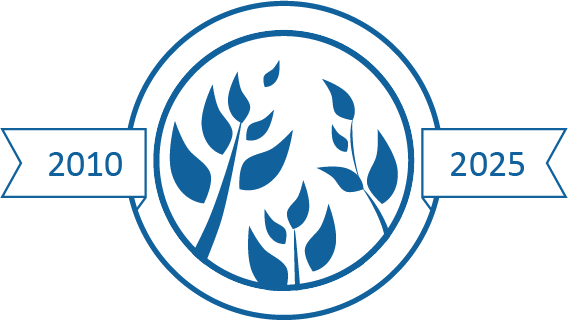Download our 15 Year Anniversary publication here.
In 2025, the Global Young Academy (GYA) is marking its 15th anniversary—a milestone that celebrates a decade and a half of empowering young scientists and fostering international scientific collaboration. During this time, the GYA has directly impacted its 650 members and alumni in over 100 countries, supported the founding of dozens of young academies and similar bodies, and helped build capacity in early-career researchers (ECRs) around the globe through Scientific Leadership Programmes and At-risk scholar workshops.
Founded in 2010 in Berlin, Germany, the GYA grew out of discussions among top young scientists and researchers from around the world during meetings convened by the InterAcademy Partnership (IAP) at the Annual Meeting of New Champions of the World Economic Forum (“Summer Davos” meetings) in 2008 and 2009. These gatherings brought together promising ECRs, united by a shared mission: to create a platform where young scientists could contribute meaningfully to global scientific discourse and policy. The Tianjin Statement of Global Young Scientists, which resulted from that meeting, constitutes one of the founding documents of the GYA.
The founding of the GYA was supported by the IAP, the German National Academy of Sciences Leopoldina, the Berlin-Brandenburg Academy of Sciences and Humanities (BBAW) and the German Junge Akademie, as well as start-up funding from the Volkswagen Foundation and The World Academy of Sciences (TWAS).
From 2011 to 2016, the GYA was hosted by the BBAW in Berlin; since 2017, the Leopoldina has been hosting the GYA in its historical headquarters. The hosting of the GYA under the umbrella of the Leopoldina brings benefits and opportunities to both organisations. For example, as a global science academy the GYA
adds to the Leopoldina’s mission of representing German science internationally.
Since 2014, the German Federal Ministry of Education and Research (BMBF; now renamed the German Federal Ministry of Research, Technology and Space) has provided institutional funding to the GYA, and since 2021 this has been done jointly with the German State of Saxony-Anhalt. To finance its Annual General Meetings and other projects, the GYA and its members raise funds annually from donors and partner organisations worldwide.
From its inception, the GYA has aimed to be a “Voice for Young Scientists,” promoting interdisciplinary and international collaboration, advocating for evidence-based policy, and supporting science education and communication. Membership is highly selective, based on scientific excellence and societal engagement, and is limited to 200 members, each serving a five-year term.
In 2014, the GYA reached full membership capacity, in 2021 it reached gender parity, and since 2023, its members and alumni hail from over 100 countries.
The organization has played a pivotal role in establishing National Young Academies and similar bodies worldwide, fostering a global network of ECRs committed to addressing pressing societal challenges through science. A significant milestone in the GYA’s journey was its transition to being hosted by Leopoldina in Halle (Saale), Germany. This move solidified its institutional support and provided a stable administrative base for its expanding activities. The Leopoldina, one of the world’s oldest science academies, has been instrumental in supporting the GYA’s mission.
Over the past 15 years, the GYA has launched numerous initiatives, including working groups focused on science and society, early-career development, interdisciplinary research, and Open Science. One such example is the GYA’s Global State of Young Scientists (GloSYS), an empirical research project investigating the context in which ECRs work in various world regions. All of the project’s outputs, including the 2024 GloSYS Africa Main Report, provide data-driven insights into the experiences, challenges, and aspirations of young researchers across different continents, informing policy and capacity-building efforts.
The GYA has also collaborated with major global organizations, for example, the G7 Academies of Science (S7) and the United Nations Major Group Children and Youth (UNMGCY). Moreover, the GYA is a full member of the IAP, is a member of the International Science Council, is on the Steering Committee of the World Science Forum, and is an institutional partner of the United Nations Secretary General’s Scientific Advisory Board.
The GYA’s various collaborations have produced impactful joint publications that address pressing global challenges and promote responsible research practices. One notable example was Snapshots of Reform – Researcher Evaluation within Science Organizations, a GYA-IAP-ISC joint initiative on Research Evaluation, which aimed to rethink and reform global research assessment practices.
The GYA has also partnered with UNESCO, the European Commission’s Joint Research Centre, and TWAS on various policy statements and reports, including contributions to discussions on Open Science and Open Access. These efforts have helped shape international science policy and advocate for equitable access to scientific knowledge.
As the GYA celebrates its 15th anniversary, the Academy expresses deep gratitude to its members and alumni for their tireless efforts, to its hosting institution, as well as to its past partners, whose support and collaboration have helped the GYA work towards its mission of championing the voices of young scientists and advocating for inclusive, evidence-informed decision-making at all levels.
Of course, the GYA also looks ahead to its next 15 years with great enthusiasm, and a firm belief that GYA members and alumni, as well as future generations of ECRs around the globe, will play a defining role in generating scientific knowledge and helping shape international science policy.
Note
Further information about the creation of the GYA can be found in the GYA Connections article “Looking back: Creating the vision of the GYA”, and the 2023 the White Paper “A digital archive of GYA history“.
Our photo archive is available on Flickr here.
